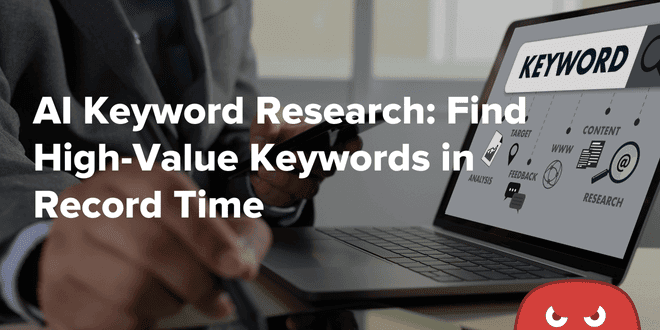
AI Keyword Research: Find High-Value Keywords in Record Time
- Finding lesser-known keywords that have enormous ranking potential
- Speeding up the keyword research process while improving its efficiency
- Catching on to emerging search trends before your competitors do
How AI Identifies Search Intent and Trends
AI tools have humans beat in terms of analyzing data, and it’s not even close. They can analyze mammoth amounts of data in seconds, which comes in extremely handy for the keyword research process. Finding viable keyword targets involves combing through tons of data, and humans can only comprehend so much. As a result, most marketers wind up targeting the exact same keywords because they rely on the same traditional keyword research tools. The way it typically works goes something like this:- A marketer types a common industry seed keyword into a research tool (like ‘digital marketing’).
- The tool provides a list of related keywords along with their search volume and keyword difficulty (KD) scores.
- The marketer selects the keywords with the highest search volume and lowest KD scores.
Using AI to find keywords that are about to blow up
Let’s use a tool like ChatGPT to illustrate what we mean. For this example, we’ll stick with the digital marketing niche. Here’s what happens when we ask ChatGPT to give us some lesser-known digital marketing keywords that are rising in popularity: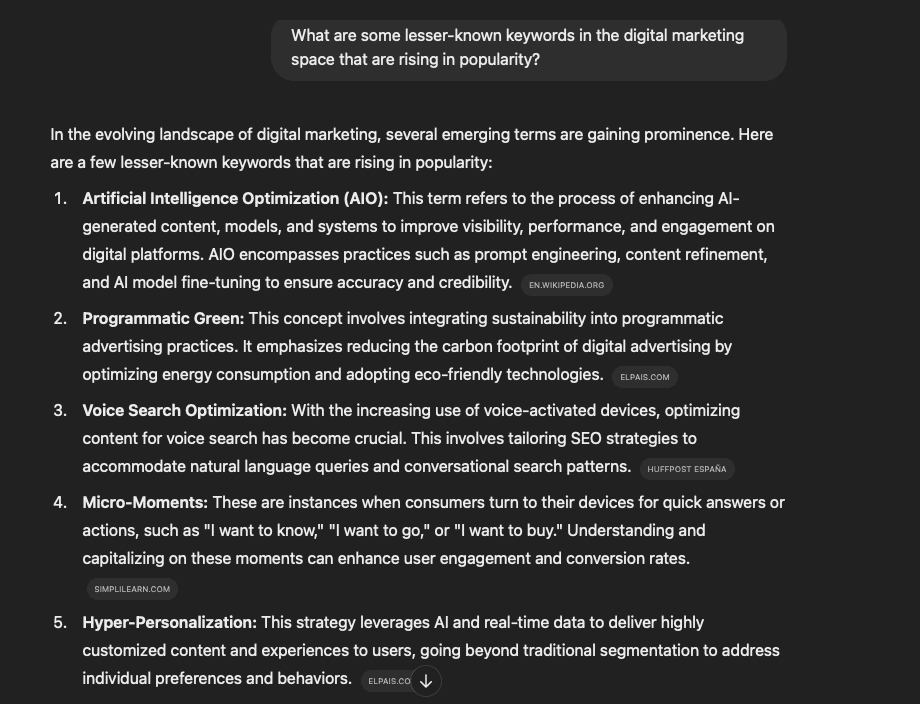 As you can see, that one simple prompt yielded lots of promising keywords:
As you can see, that one simple prompt yielded lots of promising keywords:
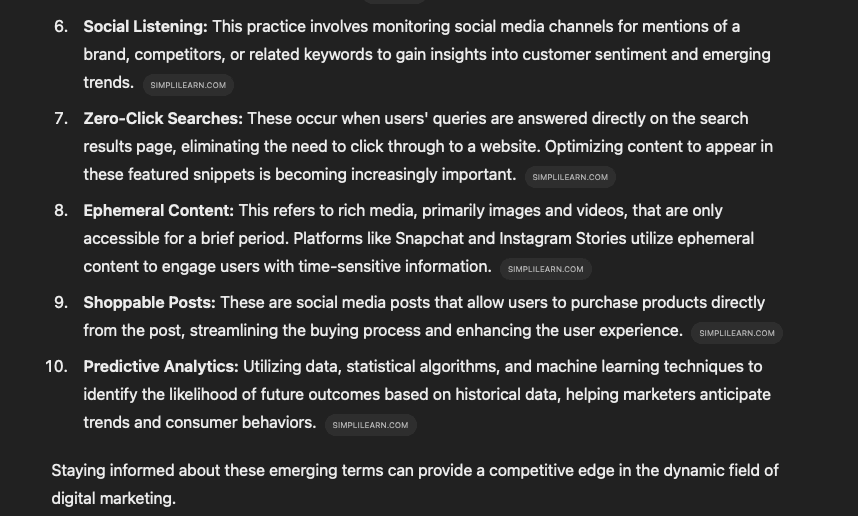 Moreover, these are all trending, extremely relevant keywords for the digital marketing space.
Concepts like micro-moments, artificial intelligence optimization (AIO), and hyper-personalization are all revolutionizing the industry, so they’re the exact types of keywords you’d want to target to stay on the cutting edge.
Yet, you shouldn’t blindly trust an AI tool’s output.
While these keywords are certainly promising, they require a little more vetting before you can use them in your SEO strategy.
The best way to do this is to vet each keyword AI provides through a traditional research tool, like our free offering.
Moreover, these are all trending, extremely relevant keywords for the digital marketing space.
Concepts like micro-moments, artificial intelligence optimization (AIO), and hyper-personalization are all revolutionizing the industry, so they’re the exact types of keywords you’d want to target to stay on the cutting edge.
Yet, you shouldn’t blindly trust an AI tool’s output.
While these keywords are certainly promising, they require a little more vetting before you can use them in your SEO strategy.
The best way to do this is to vet each keyword AI provides through a traditional research tool, like our free offering.
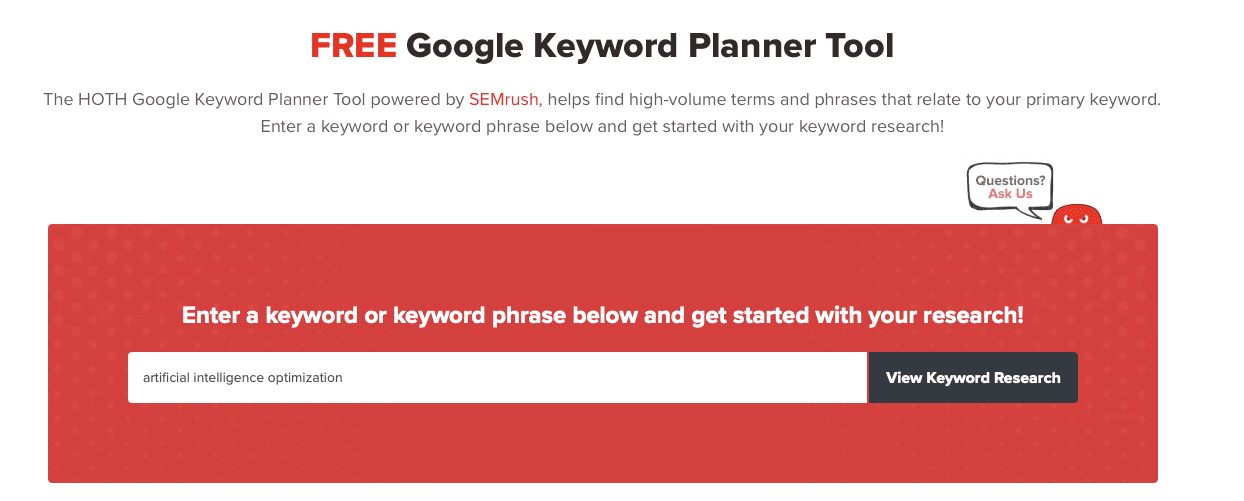 It’ll let us peep crucial metrics like search volume, trend, and keyword difficulty, so let’s pop in one of the keywords ChatGPT just told us about (artificial intelligence optimization).
It’ll let us peep crucial metrics like search volume, trend, and keyword difficulty, so let’s pop in one of the keywords ChatGPT just told us about (artificial intelligence optimization).
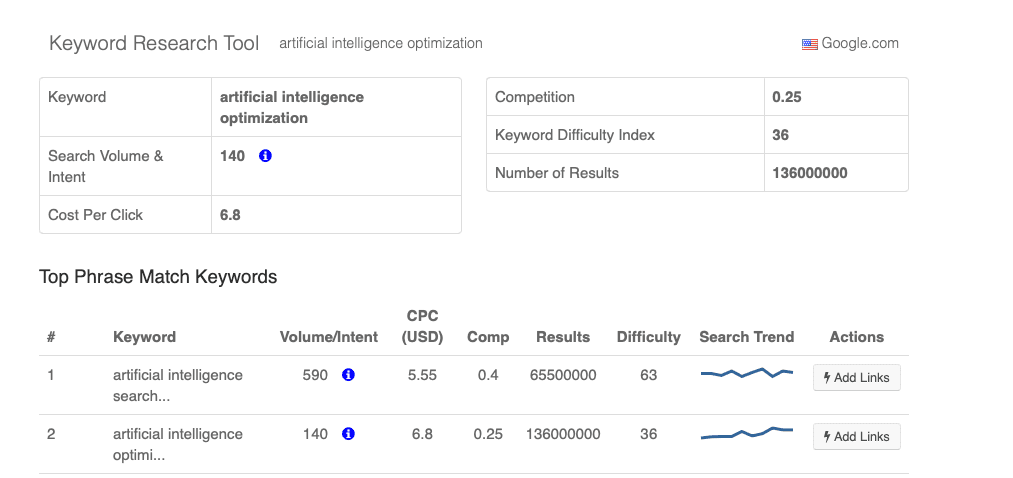 Sure enough, we can see that the keyword (and two related keywords) has the right metrics we’re looking for, and they’re rising in popularity (evidenced by the trend line graph).
Sure enough, we can see that the keyword (and two related keywords) has the right metrics we’re looking for, and they’re rising in popularity (evidenced by the trend line graph).
Using AI tools to understand the search intent behind keywords
Finding valuable keywords is only one part of the equation. You also need to properly identify each keyword’s search intent to ensure you create the right type of content for it. Search intent refers to the ‘why’ behind a keyword. For example, the keyword ‘buy shoes near me’ clearly shows an intention to purchase shoes at a local business. As a quick refresher course, keywords typically have four types of search intent, which are:
As a quick refresher course, keywords typically have four types of search intent, which are:
- Informational. Whenever a search user is trying to learn something by searching for a keyword, it has informational intent. This means the user wants to educate themselves on a new topic (or learn skills). These types of keywords are best for raising brand awareness and building trust with your customers. They’re called TOFU (top-of-the-funnel) keywords because they exist at the top of your sales funnel (when prospects are learning about your brand and products).
- Navigational. A keyword has navigational intent whenever a searcher uses it to find a specific web page online. Examples include ‘netflix’ and ‘amazon sign in.’
- Commercial. Whenever a user is researching an eventual purchase, they use keywords that have commercial intent. Common commercial keywords include phrases like ‘buyer’s guide,’ ‘comparison’, and ‘best (blank) product.’
- Transactional. Lastly, a keyword has transactional intent whenever the user wants to make an immediate purchase. This means they’ll buy something either before their online session is over or at a local business soon after. Common transactional keywords include phrases like ‘buy now,’ ‘discount,’ and ‘near me.’
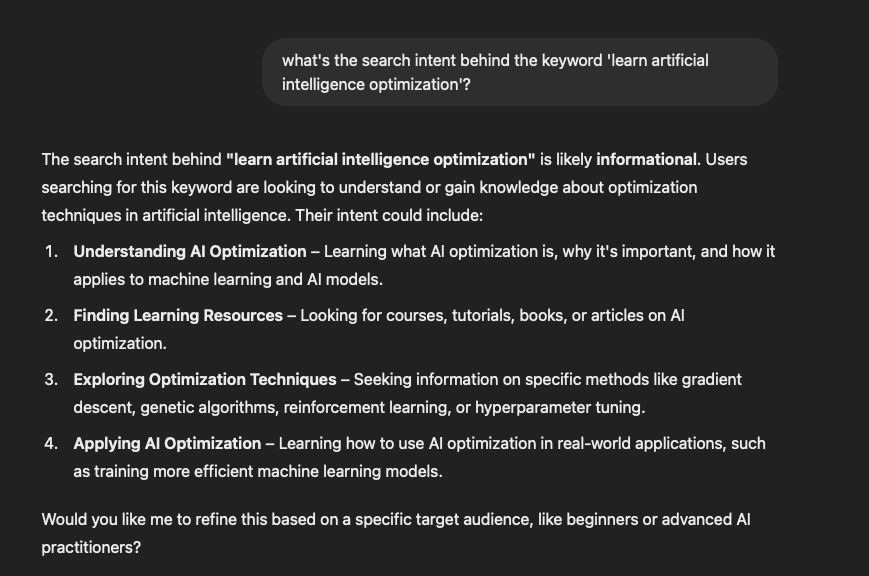 At first, it gives us a pretty basic answer by letting us know that it’s an informational keyword.
However, we can get more detailed insights by telling ChatGPT to refine its output for a specific target audience. In this case, we chose to tailor the response for advanced AI practitioners.
Here’s what we got:
At first, it gives us a pretty basic answer by letting us know that it’s an informational keyword.
However, we can get more detailed insights by telling ChatGPT to refine its output for a specific target audience. In this case, we chose to tailor the response for advanced AI practitioners.
Here’s what we got:
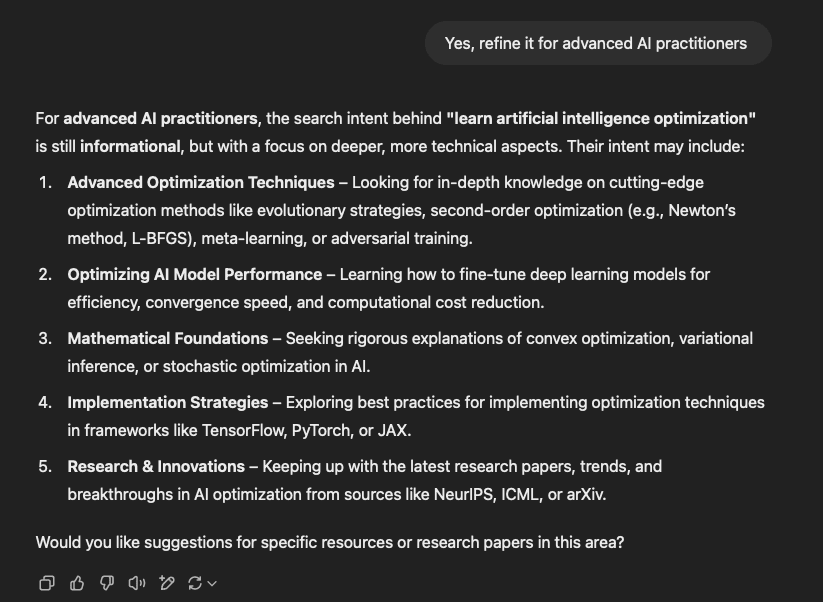 As you can see, we get a more in-depth analysis of the search intent this way. Instead of looking for generic information on AIO, these experts are after deeper technical knowledge.
If you were creating content for this type of audience, you would want to create advanced guides on topics like meta-learning and stochastic optimization.
While creating high-level content like this may take more time and effort than creating run-of-the-mill guides, it’s the type of content your audience is looking for the most – so you stand to gain the most from it.
As you can see, we get a more in-depth analysis of the search intent this way. Instead of looking for generic information on AIO, these experts are after deeper technical knowledge.
If you were creating content for this type of audience, you would want to create advanced guides on topics like meta-learning and stochastic optimization.
While creating high-level content like this may take more time and effort than creating run-of-the-mill guides, it’s the type of content your audience is looking for the most – so you stand to gain the most from it.
What are the Best AI-Powered Keyword Research Tools?
Next, let’s explore how you can start conducting AI-driven keyword research by examining the best tools on the market. We’ll examine, review, and compare:- ChatGPT (free option)
ChatGPT: Free AI-powered keyword research
 We’ve already shown a few examples of how you can use ChatGPT to aid in your keyword research process, but that’s only scratching the surface.
There are countless ways you can prompt the program to give you viable keyword tips and opportunities, and you can do it all using ChatGPT’s free version.
With it, you can:
We’ve already shown a few examples of how you can use ChatGPT to aid in your keyword research process, but that’s only scratching the surface.
There are countless ways you can prompt the program to give you viable keyword tips and opportunities, and you can do it all using ChatGPT’s free version.
With it, you can:
- Build extensive keyword lists
- Uncover keywords that are gaining popularity before they peak
- Ask for advice for forming keyword strategies
- Explore thousands of long-tail keywords
- Uncover a keyword’s search intent based on numerous factors (like target audience as we showed before)
Pros
- Tons of applications and use cases
- The ability to ask normal questions
- Outputs are typically accurate and helpful
Cons
- The need for fact-checking can put off some
- Outputs aren’t always 100% accurate
- It can be difficult to adjust to if you’re used to traditional keyword research tools
Semrush: An all-inclusive SEO platform enhanced by AI
Semrush is a leading SEO platform that’s been adding innovative AI features all the time. One such example is its Keyword Magic tool, which has a new AI-powered twist. Instead of entering generic seed keywords as you would with a traditional research tool, you can add your domain to see personalized insights generated by AI.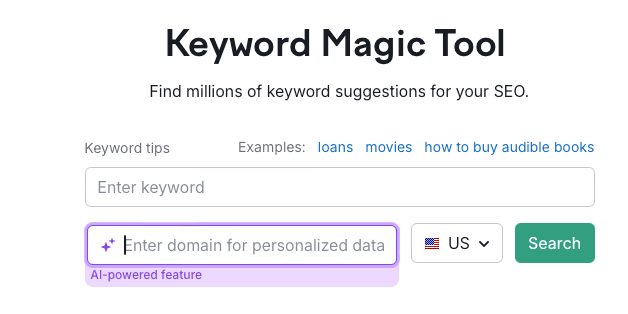 The tool works by combining Semrush’s existing keyword database (which is massive) with large language models (LLMs). This combination lets the tool determine the relevancy between a domain and specific keywords, enabling the following features:
The tool works by combining Semrush’s existing keyword database (which is massive) with large language models (LLMs). This combination lets the tool determine the relevancy between a domain and specific keywords, enabling the following features:
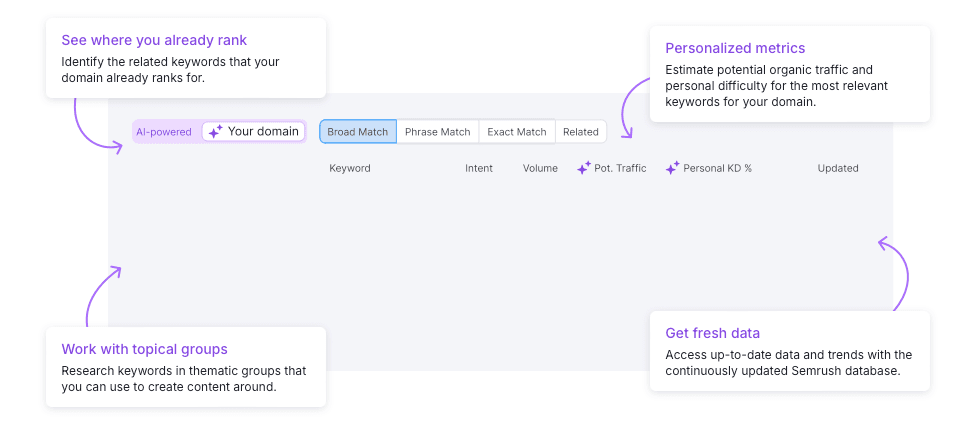 This is useful for determining if certain keywords are worth pursuing, as you’ll get a personalized keyword difficulty score based on your domain’s current metrics.
It’s also great for forming thematic keyword clusters that you can use for content creation.
This is useful for determining if certain keywords are worth pursuing, as you’ll get a personalized keyword difficulty score based on your domain’s current metrics.
It’s also great for forming thematic keyword clusters that you can use for content creation.
Pros
- The AI-powered feature adds more utility to an already useful keyword research tool
- It provides highly personalized data that makes it easier to make certain decisions (like if a keyword is too hard to pursue for your specific domain)
Cons
- It’s a paid tool, and the subscription price may be a bit steep for smaller businesses
- It lacks the versatility of a chatbot where you can ask specific questions
Surfer: Popular content creation tool that features AI
Surfer is one of the most popular choices among marketers for content creation due to its amazing editor. However, the tool also contains features for keyword research via its extension for Google Chrome. You’re able to generate relevant topic clusters for your niche.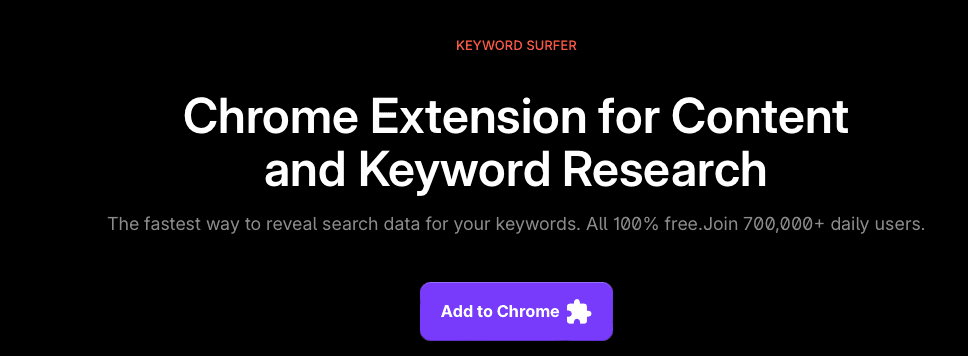 It contains datasets from 70 different countries, and it provides all the search metrics you’d expect from a keyword research tool (like search volume, keyword difficulty, and CPC, among others).
Since it’s a browser extension, you’re able to perform keyword research on the fly. This comes in handy for marketers who don’t like monotonous tab-switching and prefer to keep everything in one place.
It contains datasets from 70 different countries, and it provides all the search metrics you’d expect from a keyword research tool (like search volume, keyword difficulty, and CPC, among others).
Since it’s a browser extension, you’re able to perform keyword research on the fly. This comes in handy for marketers who don’t like monotonous tab-switching and prefer to keep everything in one place.
Pros
- Its browser extension makes conducting keyword research quick and easy
- The tool makes keyword clustering effortless
Cons
- It lacks the utility of a tool like ChatGPT
- You can’t modify the keyword clusters you create
How to Use AI-Driven Keyword Clustering
Before we wrap up, let’s talk about another area where AI helps the keyword research process: keyword clustering. What’s that? Keyword clustering is where you group similar keywords that have the same search intent together on the same page. It involves declaring one primary keyword and then backing it up with similar secondary keywords. For example, let’s consider ‘digital marketing services’ our primary keyword. Similar keywords that are after the same thing would include:- General digital marketing services
- Online marketing services
- Digital marketing agency
- Full-service digital marketing
- Best digital marketing agency
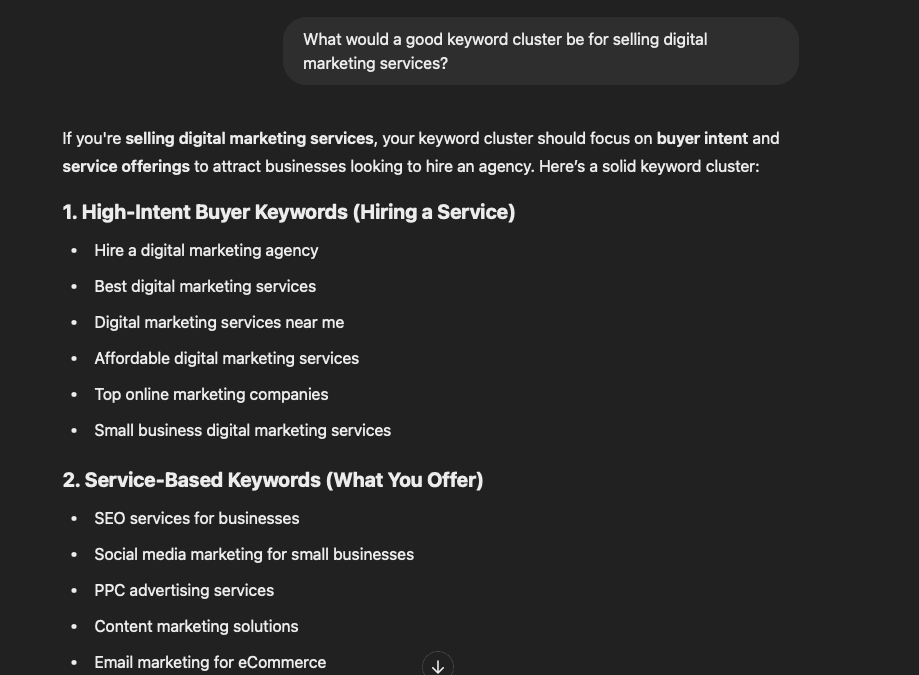 It arranges each cluster into bulleted lists for your convenience. This keeps your clusters organized, as you can easily copy and paste them into a document to work with later.
Once again, you can also tweak the suggestions based on your audience. In this next example, we asked it to tailor the list for digital marketing agencies wanting to white-label SEO services:
It arranges each cluster into bulleted lists for your convenience. This keeps your clusters organized, as you can easily copy and paste them into a document to work with later.
Once again, you can also tweak the suggestions based on your audience. In this next example, we asked it to tailor the list for digital marketing agencies wanting to white-label SEO services:
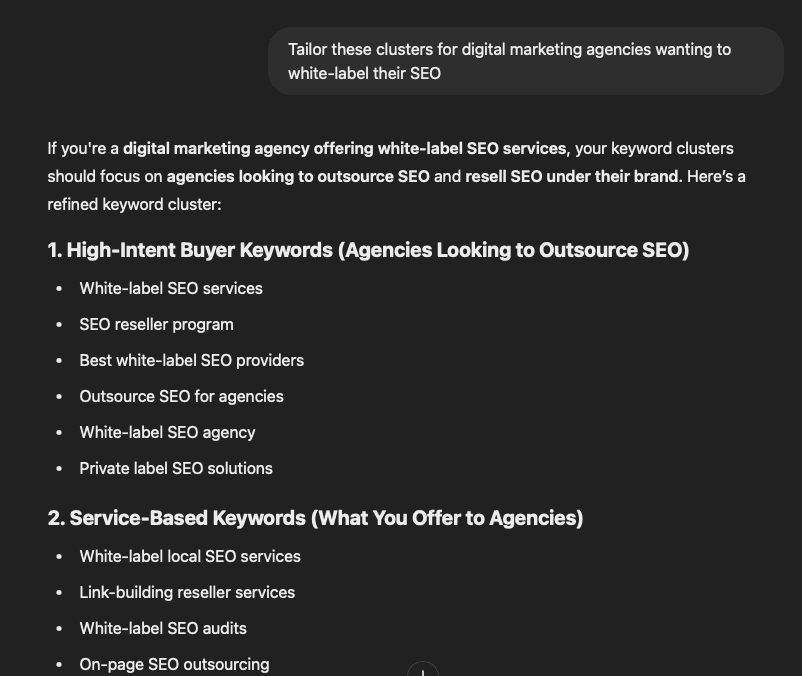 Further refining the prompts like this will help you land on the picture-perfect keyword clusters for your content.
Also, don’t forget to vet these clusters using other tools to ensure they’re actually viable.
Further refining the prompts like this will help you land on the picture-perfect keyword clusters for your content.
Also, don’t forget to vet these clusters using other tools to ensure they’re actually viable.
The Future of AI in Keyword Research
Out of all the aspects of SEO that AI can impact, keyword research is arguably the most significant. It’s always been a data-heavy process, so it’s the perfect environment to unleash an AI tool. Moving forward, AI keyword research tools are bound to become even more prevalent, so your best bet is to get on board now so that you don’t get left behind. Do you need help putting together a winning SEO strategy for your business? HOTH X, our fully managed SEO service, is the solution. Our team of experts will take the entire SEO process off your hands so that you can sit back and watch your business grow, so don’t wait to get in touch!The author
Rachel Hernandez
description
Previous
AI-Driven Link Prospecting: Find Valuable Backlinks Quicker
Next
AI is Transforming Local SEO: What Marketers Should Know
Discussion
Comments
future
September 17th, 2025
wowo article
diaca
September 16th, 2025
beautiful articles
diaca
September 16th, 2025
Nice articles I learn a lot, thanks, and Wakanda forever,
